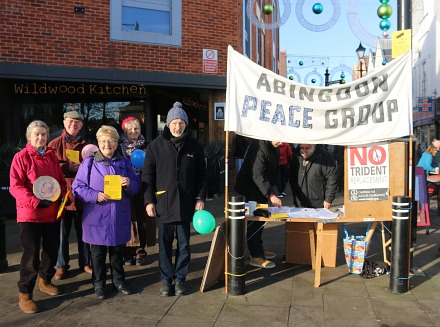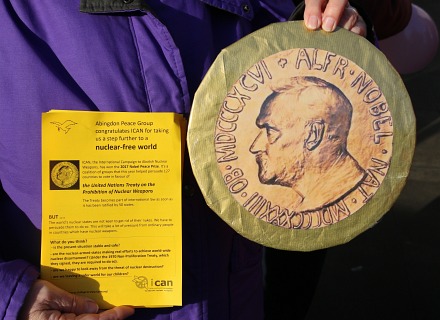
The Abingdon Peace Group were in the town centre on Saturday to congratulate ICAN on winning the 2017 Nobel Peace Prize. The group ICAN convinced 122 nations to sign a UN treaty banning nuclear weapons.

ICAN, the international campaign to Abolish Nuclear weapons, is an international coalition of groups, including survivors from the Hiroshima and Nagasaki nuclear bombings.
The Organisation for the Prohibition of Chemical Weapons won the Nobel Peace Prize in 2013.
Apologies for going off thread but I’m just watching the Marigold Hotel series on t v, this week they’re in Cuba, last week it was China and the interesting thing to me is the way both countries encourage their older generations to take regular exercise, they provide quite free of charge daily excercise and dance sessions, by contrast our council want to charge the elderly over £30 each for basic membership to the leisure centre, but give away free bus passes! Would it not be more beneficial to have free gym
membership but charge for bus use?
It is very commendable to want to abolish nuclear weapons but more countries seem hell bent on aquiring them. Some people claim that having nuclear weapons has prevented war as countries are reticent to attack other countries because of the consequences. I am not in favour of Britain getting rid of nuclear weapons when other countries will not get rid of theirs leaving the UK with no deterrent. I would like to know which countries banned nuclear weapons? It is certainly not India, Pakistan, China, North Korea, France, Russia and the USA. (Officially.). It is thought other countries have nuclear weapons or are developing them such as Iran and Israel.
I can understand why people believe we are safer with nuclear weapons as we have been fed this line for so long. But we are really not! We are at risk of a catastrophic nuclear accident, or an impulsive world leader, every day. No-one is expecting the nuclear-armed states to give them up overnight, this is about gradual negotiated dismantling and is our best chance of survival. The Nobel prize ceremony is well worth watching to hear all the arguments – https://www.youtube.com/watch?v=P1daV8n6fTY&feature=youtu.be
To date no nuclear-armed states have signed – they would have to have the agreement of their governments and the support of the people first, but the tide is changing. Many people in UK feel £205 Billion is too high a price to pay to modernise the weapons we can never use – if it were really only for deterrence one bomb is all you would need.
ICAN at http://www.icanw.org/ have the names of all the signatories .
Sadly, nukes can’t be un-invented.
That means we’ll always have them – at least until a way of neutralising their effects is found.
Not prepared to be at the mercy of North Korea, Pakistan or even France if things go [further] awry in any of those countries.
Campaign by all means. Like motherhood and apple pie, sure everyone is in favour of global disarmament. Apart from anything, it’d save a lot of money.
Any campaign needs to demonstrate how this will be achieved.
I, for one, am glad the Nobel Peace Prize was awarded this year to ICAN whose purpose is to draw attention to the catastrophic humanitarian consequences of nuclear war and ways of eliminating such weapons. So far we have been spared, not by prudent government but by good fortune. While our mutual destruction is only one human or technical error – or an impulsive tantrum – away, the only rational course of action is to work, in all ways possible, to the gradual reduction of such weapons.
Canada disarmed in 1984.
Of course, they could rapidly re-arm.
Other countries that could rapidly produce nuclear weapons “at the turn of a screwdriver” (as the phrase goes) are Germany, Australia, South Korea, Japan, South Africa and Brazil.
Hostile nations, or groups, are not going to agree to disarm; we have to be strong enough to repel possible attack. Nuclear weapons are obviously thought necessary. The powers that be will be forever looking for ways to save money on defence.
Our nuclear deterrent is just that and won’t ‘repel’ anything. Once the weapons are in action it has failed and so have we. The 2 big threats to this country are localised terrorism and large-scale ‘cyber’ warfare which we are fighting against at the moment. Nuclear weapons don’t seem to be very effective in those areas.